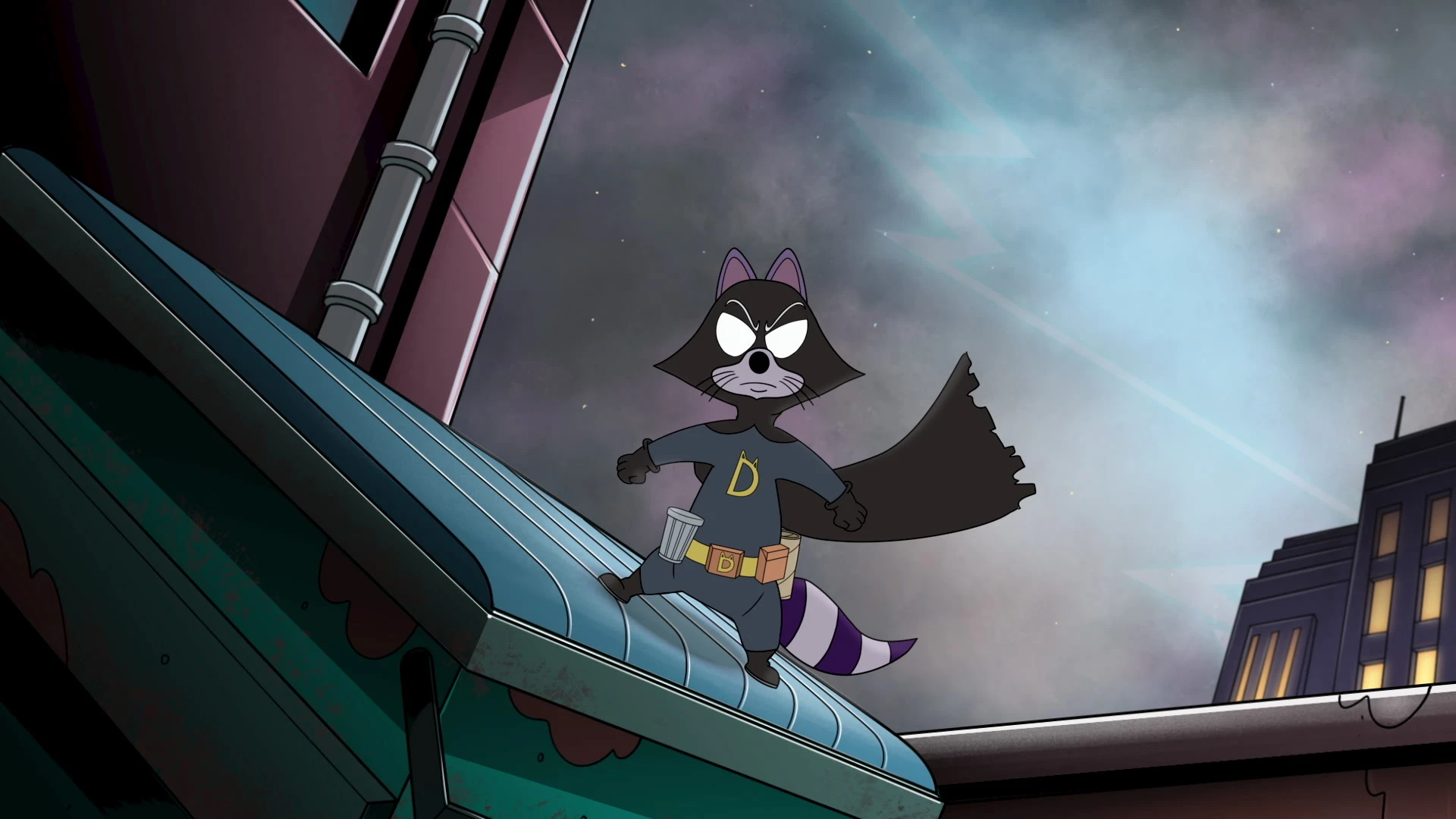Learn About Civil Disobedience with Tuttle Twins
Ethan and Emily Tuttle are breaking into the filmmaking scene when they set out to make a movie. The twins hit a hiccup when a silly regulation forces them to yell “cut.”
With the help of legendary activist Rosa Parks, as well as an odd Boat-Dweller by the name of Doug, the twins learn about civil disobedience and how to fight unjust laws. The audience will also enjoy a rare appearance of the mysterious vigilante Dark Dumpster Derek. Read on for more about this important episode of Tuttle Twins: “Dumpsters & Disobedience.”
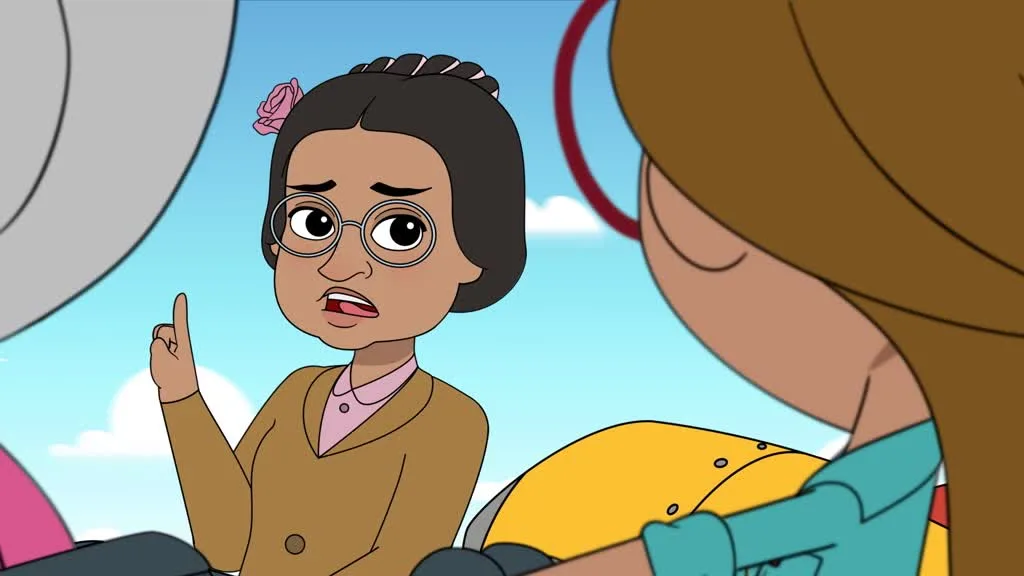
Episode 9: Dumpsters & Disobedience Plot Summary
The episode opens with a dramatic scene: two robbers emerge from a bank, their arms laden with bags of cash. With sirens blaring in the distance, they run and take refuge in an alley, confident they’ve escaped justice, when, all of a sudden, a dark figure appears atop the wall. The robbers gasp—it’s Dark Dumpster Derek! The four-pawed hero reclaims the stolen money and—with the power of garbage—captures the robbers with plastic soda rings.
“Cut!”
The lights come on, and Ethan and Emily Tuttle emerge from their directorial seats. Their submission for the local film festival is one scene away from completion. The film’s guest director, Alfred Hitchcock, is commending the gang for their filmmaking skills when they hear a sudden shout.
A neighbor of the alley, named Herbert, yells down from his balcony that their theatrical activities are, in fact, illegal: by local regulation, children younger than 16 are not allowed to film movies within city limits.
The twins are dumbfounded at the silly law; it seems that this busybody just likes to shut down fun wherever he finds it. The two are in the midst of agonizing over their decision, when Grandma Gabby flies in. The twins fill her in on the situation but are optimistic they can mobilize as citizens and use petitions, phone calls, and good-old-fashioned determination to get the law changed. Gabby reminds them, however, that that process will take far too long, and the film festival is creeping closer and closer. Suddenly, Gabby has an idea. Before they know it, the twins have swooped into the state of Georgia in 2010.
The group makes a swift landing on a river, and roll up to a makeshift house on a log raft. Gabby calls to its inhabitant—her friend Doug—that they’ve come to arrest him for living there an unlawful amount of time…just kidding. She makes it clear that they are there to party. Ethan explains their predicament to Doug, making a bold statement.
“Unfair laws only seem to affect us,” Ethan says, drawing a laugh from Gabby and her friend. They teach the twins that this experience isn’t unique to them, and Doug launches into a musical number that teaches a very important truth: that “just ‘cause something’s illegal, doesn’t mean it’s wrong.”
After meeting with Doug, the twins realize they’re not alone, but admit that they still can’t change the law in time for the film festival. Realizing there are still essential lessons to be learned, Grandma Gabby takes the twins even further back in time—to Montgomery, Alabama in 1955. More specifically, Gabby takes the kids to a cell in the local jail, belonging to a Mrs. Rosa Parks.
A bit of Grandma Gabby’s intuition and a handy device called a Holo-Grandma helps the twins to briefly break Mrs. Parks out of jail. As they travel with the revered civil rights activist, she explains to the kids why she made the courageous decision to break the infamous bus law. “Sometimes it’s okay to civilly disobey,” she advises Ethan and Emily. Rosa cautioned the twins that she didn’t simply choose to start disobeying any law she didn’t like; she knew the law was unjust, had chosen carefully what to stand for, and was prepared to accept any consequences before being civilly disobedient.
While Francis—an officer on duty at the jail—finds an excellent listener and friend in hologram Rosa, the real Mrs. Parks is accompanying the gang to a voting center in Rochester, New York in the year 1872.
A woman is marching to the ballot box and offers her ballot to be counted, and the twins learn that the woman is famed suffragette Susan B. Anthony. The man behind the desk laughs, reminding her that women aren’t allowed to vote in the presidential election. When she refuses to back down, law enforcement comes to take her away.
Emily calls after Susan to keep on trying. “Because of people like you, someday I can run for president!” Emily says to her as she’s removed from the building.
It’s time for the group’s last stop before returning to the present day. Rosa Parks advises Ethan and Emily that plenty of unjust practices have been protected by law at different points in time, and that even slavery was once legal. She points out that it was even illegal to help break slaves out. Armed with this mission, the twins are ready for their last stop: Cambridge, Maryland in the year 1851.
The group peer out from their hiding place among the bushes, and see a few runaway slaves slipping through the night. Gabby and Rosa explain to the twins that Harriet Tubman worked to help free slaves from their masters, even though she knew the consequences. Tubman even proclaimed, “I would fight for my liberty, so long as my strength lasted.”
The twins realize that Harriet Tubman’s courage in standing up for what she knew was right influenced the world, and slavery eventually became illegal. Grandma Gabby gives the twins some cautionary advice: “If you base your morality on only what’s legal, you could find yourself agreeing with people like [the mobs that chased Harriet Tubman and the runaway slaves].”
Ready to face their cinematic dilemma, the gang drops Rosa Parks back in her cell. Even though a now strangely refined Derek has finished off the knowledge juice, they manage to get out just in time to evade an investigating guard.
With newfound wisdom, Ethan and Emily return to the set. The pair stand up before all their friends, acknowledge the law that’s working against them, and ask everyone if they want to civilly disobey the law. Copernicus, Gabby, Derek, and two others decide to stay, while the rest are uncomfortable with the idea.
Their nosy neighbor Herbert overhears the impassioned speech, but refuses to change his mind. Moments later, a police officer arrives. He apologizes for the dumb law, but lets the group know that there will be a $200 fine if they continue to film their movie, and the twins are left with a difficult choice.
Two months and $200 later, overbearing Herbert is watching his evening TV when a familiar production wins the local film festival: none other than Ethan and Emily’s “Dark Dumpster Derek: The Raccoon Who Loved Me.” Overcome by the magnificent piece of cinema, he starts to cry and applauds for the twins’ creation.
When Ethan and Emily take the stage to accept their award, they thank their cast, crew, and their friend Rosa. The two make a plea to the city to ask that the law be reviewed, and give “a special no-thanks” to their favorite nosy busybody.
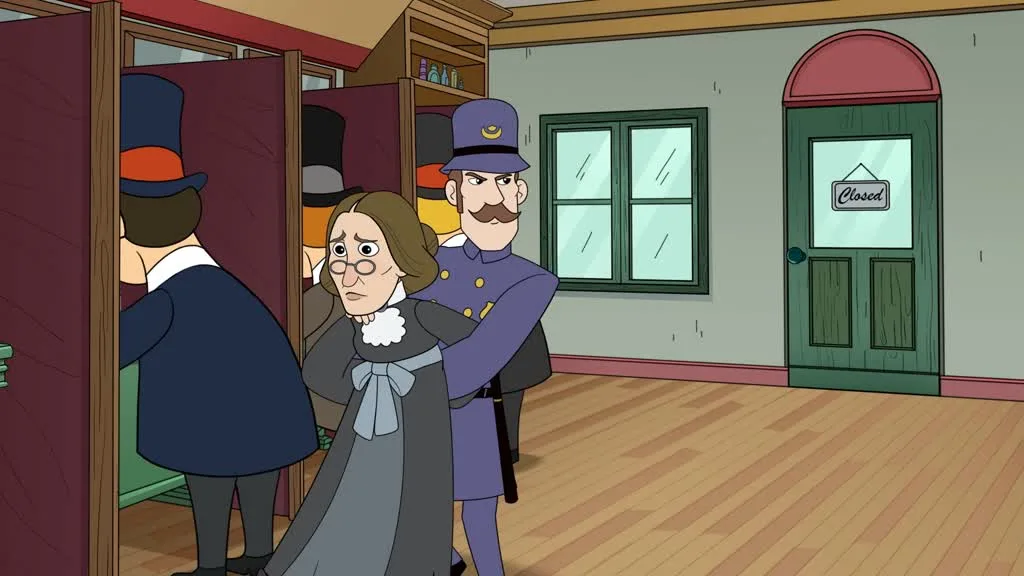
What Did We Learn in “Dumpsters & Disobedience”?
When a nosy neighbor cites an unreasonable law to shut down the twins’ film set, Grandma Gabby sets out to teach the kids the principle of civil disobedience. The group makes pit stops to meet several influential historical figures who harnessed civil disobedience to enact meaningful change.
The gang starts by picking up Rosa Parks. In 1955, Mrs. Parks was seated at the front of an Alabama bus, when a white passenger boarded the bus and asked for her seat. By law, Black passengers were to surrender their seats for white individuals and sit in a segregated section at the bus’s rear. Parks famously and courageously declined, and was arrested for her defiance.
With Mrs. Parks in tow, Grandma Gabby then takes the group to visit none other than early suffragette Susan B. Anthony. Anthony, an active advocate for the right of women to vote in American elections, was arrested for casting her vote in the 1872 presidential election.
Last but not least, Gabby and Mrs. Parks hide out with the twins and watch as Harriet Tubman helps to smuggle slaves along the Underground Railroad. Tubman was one of the most prolific “conductors” on the Underground Railroad, a network of safe-houses meticulously placed to conceal slaves as they escaped to the free North. Tubman helped to free at least dozens of slaves.
After learning from some of history’s most effective civil rebels—to whom we owe the freedoms we enjoy today—Ethan and Emily come away from the day’s adventure knowing a few very important truths about civil disobedience:
Civil disobedience means peacefully breaking the law.
Sometimes it’s okay to civilly disobey.
If you choose to break a law, you need to be prepared to accept the consequences.
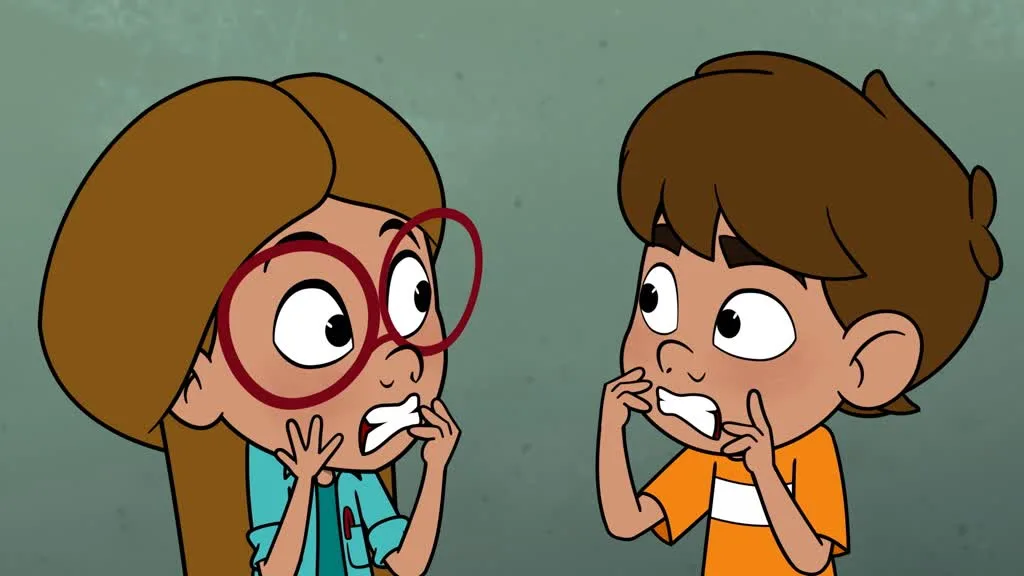
Be Like Ethan & Emily
Good citizens of all ages need to understand civil disobedience and know when it’s necessary. In this episode of Tuttle Twins, Ethan and Emily learn how they can effectively and peacefully oppose unjust laws from historical heroes Rosa Parks, Susan B. Anthony, and Harriet Tubman.
Parents, you can raise your children to be courageous and peaceful warriors for freedom, to know when a law is unjust, and when action should be taken.
How can you teach your kids about civil disobedience?
Share with them stories about historical heroes that practiced civil disobedience (Rosa Parks, Susan B. Anthony, Harriet Tubman, etc.).
Participate with them in age-appropriate political activities for causes you believe in.
Review current events, and help them to practice thinking critically about what they read.
Teach them to respect the law, and emphasize that civil disobedience should only be used as a last resort against laws that are truly unfair.
Outline important values they should hold, that can help them detect tyranny in government (justice, equal treatment, fairness, etc.).
Facilitate a mock debate session, in which your children have the opportunity to—calmly and resolutely—prepare and deliver their thoughts on a current issue.
Emphasize the fact that civil disobedience must always be peaceful.
The lessons learned by your favorite time-traveling twins can be an excellent springboard into key conversations about citizenship and freedom. Use Tuttle Twins to open a rich discussion about how each of us can maintain our inalienable rights.
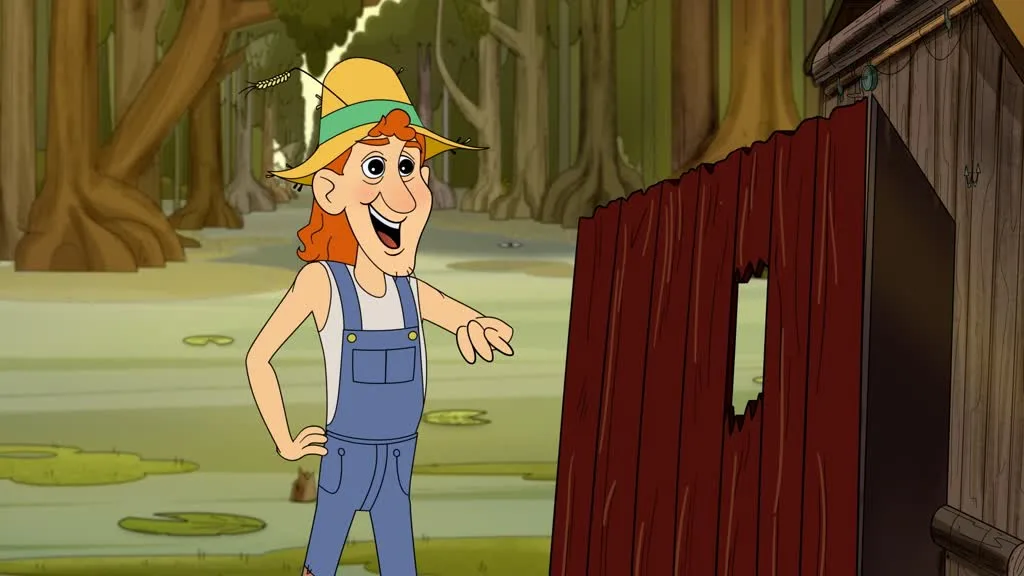
Support Tuttle Twins
TV shows that amplify light, teach valuable principles, and consistently bring laughs are a rare find—which is what makes Tuttle Twins so special. The series follows a set of inquisitive, resourceful twins who, with the help of their Grandma Gabby and her time-traveling wheelchair, travel to meet historical heroes and learn important lessons about freedom and economics.
Sound like your type of entertainment? Check out the next episode of this exciting and enriching series, entitled “Roll for Power.” In a game of “Crisis & Creatures,” the twins discover the consequences of surrendering one’s freedoms during times of trouble and the value of a community that readily helps each other during times of calamity.
The Tuttle Twins gang is sure to keep both kids and adults entertained and in the know. Stream the hit series for free on the Angel Studios app, or at Angel.com/TuttleTwins.
Want to see more of Ethan and Emily’s educational antics? It’s the fans of Tuttle Twins—just like you—that allow us to make more episodes of this hilarious and informative series. Pay it Forward to help fund more episodes of Tuttle Twins.
That’s not all! You can now show your love for Tuttle Twins on your sleeve—literally! Browse official Tuttle Twins apparel, books, and beyond, and help produce more of your favorite show.
Join the Guild to Unlock Masterful Storytelling.
Help Transform the Industry.
Your membership directly contributes to the production of shows like Tuttle Twins, allowing filmmakers to tell more stories that uplift, entertain, and amplify light.
